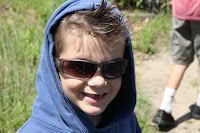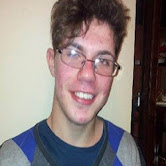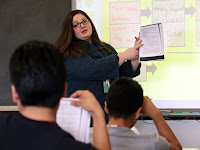
From birth to 12 years—
Raising our wonderful son Kyle wasn't an easy task, especially for a first time mother. We lived on a farm a fair distance from town and I didn't know many people at first.
Kyle had a difficult birth; he was eight days late (in summer) and then decided to arrive in a rush. From first contraction to birth was approximately three hours and I was having two minute contractions on the 25km trip to hospital. He voided just before birth and needed his mouth and airways cleared so it was fairly scary waiting for that first cry.
As Kyle had low blood sugar he was transferred to a major hospital for more intensive care. His poor tiny feet were pricked every two hours to test his blood sugar and after a while, when they squeezed to get the drop of blood, all the other pricks would ooze too. Horrible for Kyle and terrible thing for me to watch.
He walked at 12 months and started talking at about the right time; however we didn't realize that we were the only ones who could understand him. At playgroup he always stayed by himself or with his only friend Shawn, never joining in with group activities. The clinic sister was the one who picked up on Kyle's speech difficulties when I started taking his baby sister for her weekly check-ups.
We did 12 months of speech therapy which helped enormously though he had no idea of how to sequence picture card stories. He has always been very intelligent with a vocabulary way above his chronological age so this inability to sequence stories was a mystery.
I wasn't too worried that he didn't join in at playgroup. Living on a farm meant we didn't have too many visitors with young kids for him to learn to interact with.
Pre-primay was good for him. I even enrolled him in 4 year old pre-primary as intellectually he was ready and he needed that interaction with his peers. He loved pre-primary and seemed to blossom.
However, when he started year one, the same kids he had gone to playgroup and pre-primary with turned on him and started teasing and bullying him. We were at a loss to explain this and unfortunately the school had no bullying policy at that time. Our requests for action fell on deaf ears and I spent nearly every afternoon after school calming Kyle down, telling him that perhaps Jacob had a fight with his sister and took it out on Kyle, or maybe Bobby was upset because his moms and dads were fighting and Julie didn't like any boys, not just him.
We couldn't take him out of school as there was only one school in town and home schooling was barely in its infancy then. He managed to survive primary school (not without physical and huge mental scars) but with a lot of love and encouragement from us and his one friend, he did graduate.
We shifted to a different country town in time for Kyle to start year 7. We mainly wanted access to a 5 year high school so he wouldn't have to go to boarding school, and we also wanted to be closer to a greater range of medical facilities. By this time we realized he had some sort of major problem, but the psychiatrists and psychologists we had seen in our nearest major centre were mystified. This move to a new town was a huge deal for us. My husband and kids had been born there and the family had been farming on our property for nearly 60 years. We still have extended family farming there.
However, when it came to what was going to be best for Kyle, it was no contest and we've never looked back. Sure, there were problems, especially with our 8 year old daughter Maggie who was leaving all her friends, but we got through that.
Kyle still had problems in his new school; he had lost his only friend and had trouble making new ones, as did our daughter. The only friends they did make were the ones whose moms and dads had bought up with old fashioned values - being kind, being helpful to someone less fortunate, respect for someone different, being genuine in what they said or did. Unfortunately there were very few kids like that in the new school and a lot of what I consider the 'skin deep only' ones who change friends on a daily or weekly basis and don't care who they hurt.
Through a friend in our new town, we were finally able to get an accurate diagnosis of Kyle's problem – Asperger’s Syndrome. It fit him to a tee. The diagnosis could have been written about Kyle - everything was there. I cried buckets when the diagnosis came, tears of sadness that my beautiful boy was 'handicapped', that there was not a cure for Asperger’s Syndrome, but there were also tears of relief as now we had something to work with, some way of learning how to help him. I remember my mother asking me if I wanted Kyle to 'be labeled' for the rest of his life. My answer was that if I didn't know what the problem was, I couldn't help him in any way.
It has taken a lot of love, patience, understanding, research and sheer hard work to get Kyle to where he is now but I wouldn't trade any of it for a so-called 'normal' youngster. I do wish I could have shielded him more at primary school, but back then the options were limited and I now know that those hard years have given him resilience, much more than his 'skin deep' peers might have developed.
Asperger’s Syndrome, the teen years—
High school was not going to be easy for Kyle. This is a time when students are asked to become more responsible for themselves, to move from classroom to classroom, subject to subject. And they are expected to be prepared for that subject with the correct books and any other necessary equipment. Planning ahead is not something that Asperger’s Syndrome kids do well and Kyle was unable to do this. He could not remember or work out which books he needed to take or which room to go to. Which made him frequently unprepared and late for class, something which disrupted the others and didn't endear him to his teachers or peers.
Time management is another skill that takes a long time to acquire (I'm not sure Asperger’s Syndrome people ever do). Therefore, Kyle would always do the fun things before the work related or harder stuff. If I had a dollar for every time I've said "Do the things you have to do before the things you want to do" I'd have plenty put away for a rainy day. I'm sure most teenagers are like that but with Kyle, it is something that needed reinforcing on a daily basis.
Kyle was bullied and teased very badly at school and after his formal diagnosis; we were advised by his psychologist to remove him immediately and to teach him at home. This entailed getting permission from the relevant government departments to take him out of mainstream school and into Distance Education.
Kyle's work was sent to him each week and I was responsible for making sure he did it, helping him where necessary. Kyle had a direct line to ring his teachers if he was stuck on anything and they would ring him at least weekly to check on his progress. Completed work had to be posted back to them for marking.
Even though I am a trained teacher, teaching Kyle at home put considerable strain on our relationship. He had trouble distinguishing between the ‘mother' relationship and the ‘teacher' relationship and that they were different. It was necessary for me to be very strict with Kyle during ‘school hours' to make sure his work was done. This was not the way we'd brought our kids up; we'd always used love and encouragement and friendship rather than strict rules. Kyle didn't like the ‘strict mother' and rebelled which made it doubly hard for me. On the one hand I was trying to let him have some independence and acknowledge the fact that he was a teenager in high school, but it was still necessary to keep a very close eye on him to make sure he was working. Once ‘school time' was over I would need to give Kyle a lot of extra ‘mom' time to make up for the strictness.
Kyle's sister Maggie wasn't happy with the arrangement either. From her point of view Kyle was getting all the attention while she got very little. He had me to himself all day while she had to sit on a hot bus to and from school and she still had to share me with him when she got home and to her nine year old mind it wasn't fair. I don't blame her for thinking that, it wasn't an ideal situation.
By second year high school, we had managed to find a wonderful Christian school for Kyle with caring teachers and staff. It was down in the city but we were able to find home accommodation with a compassionate family and he came home each weekend. He blossomed at this school. The kids were of a completely different mindset to what he had had at his previous school. They accepted him with his Asperger’s Syndrome and made him part of their larger ‘family'.
Unfortunately for Kyle though, the mother where he was staying became ill and couldn't keep Kyle there any longer. We were able to get him accommodation with another family but that was only short term as the travelling conditions were too confusing for him - he needed to catch a bus, a train and then another bus to get to school. We ended up bringing him home and re-enrolling him in his previous school till we could work something else out.
It was a surprise to find that the kids who had teased and bullied him eighteen months previously had matured and grown out of that sort of behavior. He was able to finish junior high living at home.
We re-enrolled him at the Christian school for senior high and he was able to get transport to and from school each day. It made for a long day for him having to leave at 6.30am and get home at 7pm but the advantages of him being at that school far outweighed the disadvantages.
Senior high was a wonderful time for Kyle as the school had a ‘big band' and this rekindled Kyle's love of music. He taught himself to play trumpet and played in all band productions, even going on tour with them to rural areas. He also started playing the piano again, something he had done extremely well as a young youngster. We hadn't been able to find a music teacher in our new town but with Kyle's love of music now giving him so much enjoyment; we were able to find one in the next town. Music became Kyle's life.
Aspects of Asperger’s Syndrome—
We've had some interesting times with Kyle. When he was aged about 8 or 9 he would twist his fingers. I'm not sure how he managed to get them into the shapes he did without injuring himself, but he'd just keep twisting these fantastic shapes. This was cured over many months by just saying quietly 'Kyle, fingers'. Eventually he slowed down the twisting then stopped it completely but soon replaced it with grinding his teeth. Again, it was 'Kyle, teeth'. It got awfully hard at times to keep the voice quiet and calm when we'd hear this grating sound every couple of minutes.
As one 'twitch' was eliminated, another would take its place. There was fork twisting and juggling (how did he get through that without losing an eye), collecting old bones from around the farm and keeping them in his room and my least favorite of all, flapping. Thank goodness that one was stopped in its tracks immediately when I showed him how he looked in the mirror. He had enough troubles as school without adding flapping his arms to the mix.
We've also had frustrating times such as when we'd taken the kids somewhere special and Kyle couldn't understand when it was time to leave. He was having fun and didn't understand that the aquarium (or shop or museum or whatever) was about to close. I'd nearly be in tears listening to him go on and on about wanting to stay. Patience might be a virtue but at times it's pretty hard to be virtuous. One day, out of the blue, it just 'clicked' for him and there were no more problems, just a 'thank you for taking me there, it was fun'. I don't know what trigger went off in his brain but I wished I knew where the switch was.
If it had not been for the
Online Parent Support program and all the support from
Mark Hutten, we would not be where we are today. “My Aspergers child” has come a long way – and so have we.
==>
How To Prevent Meltdowns and Tantrums In Children With High-Functioning Autism and Asperger's
==>
Parenting System that Significantly Reduces Defiant Behavior in Teens with Aspergers and High-Functioning Autism








.jpg)


